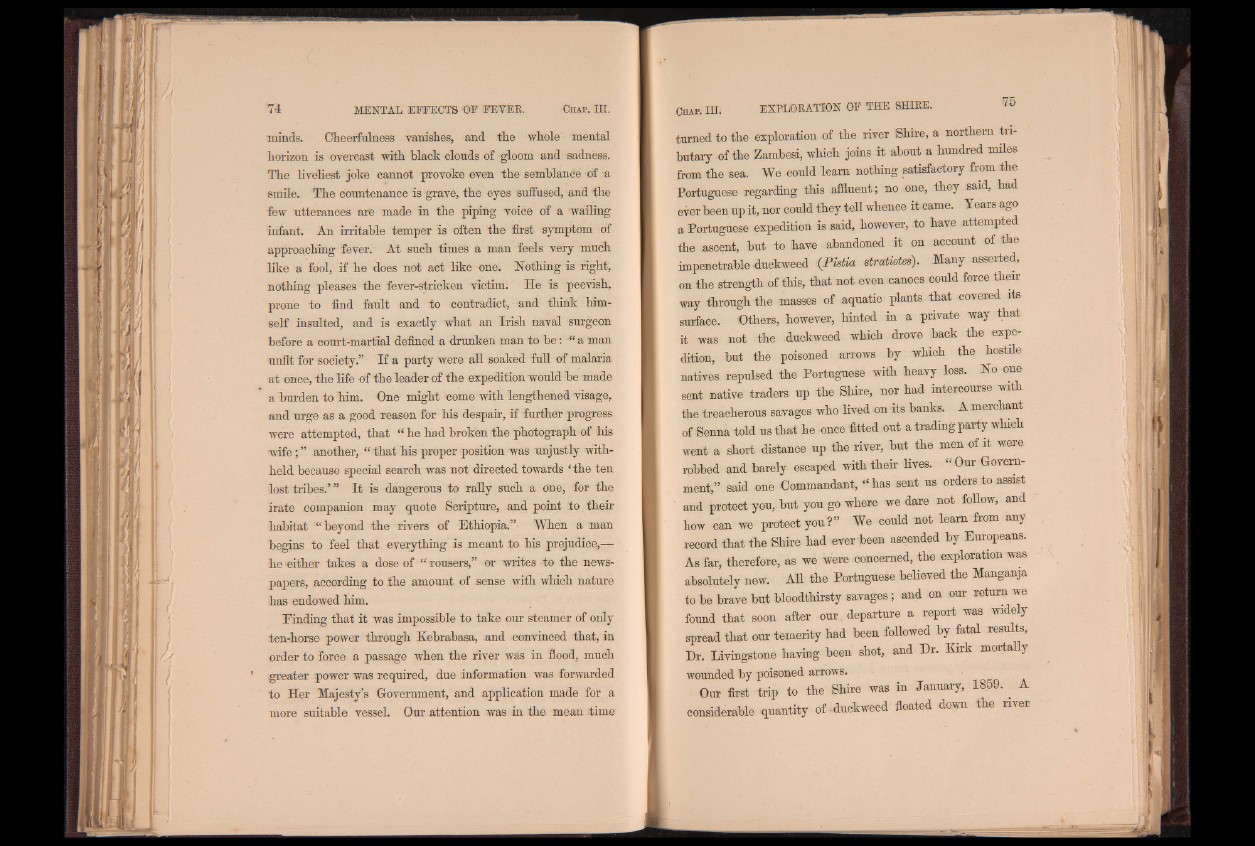
minds. Cheerfulness vanishes, and the whole mental
horizon is overcast with black clouds of gloom and sadness.
The liveliest joke cannot provoke even the semblance of a
smile. The countenance is grave, the eyes suffused, and the
few utterances axe made in the piping voice of a wailing
infant. An irritable temper is often the first symptom of
approaching fever. At such times a man feels very much
like a fool, if he does not act like one; Nothing is right,
nothing pleases the fever-stricken victim. He is peevish,
prone to find fault and to contradict, • and think himself
insulted, and is exactly what an Irish naval surgeon
before a court-martial defined a drunken man to b e : “ a man
unfit for society.” I f a party were all soaked full of malaria
at once,-the life of the leader of the expedition would be made
a burden to him. One might come with lengthened visage,
and urge as a good reason for his despair, if further progress
were attempted, that “ he had broken the photograph of his
wife; f. another, “ that his proper position was unjustly withheld
because special search was not directed towards ‘ the ten
lost tribes.’ ” I t is dangerous to rally such a one, for the
irate companion may quote Scripture, and point to their
habitat “ beyond the rivers of Ethiopia.” When a man
begins to feel that everything is meant to his prejudice,-—
he either takes a dose of “ rousers,” or writes to the newspapers,
according to the amount of sense with which nature
has endowed him.
Finding that it was impossible to take our steamer of only
ten-horse power through Kebrabasa, and convinced that, in
order to force a passage when the river was in flood, much
greater power was required, due information was forwarded
to Her Majesty’s Government, and application made for a
more suitable vessel. Our attention was in the mean time
turned to the exploration of the river Shire, a northern tributary
of the Zambesi, which joins it about a hundred miles
from the sea. We could learn nothing satisfactory from, the
Portuguese regarding this affluent; no one, they said, had
ever been up it, nor could they tell whence it came. Years ago
a Portuguese expedition is said, however, to have attempted
the ascent, but to have abandoned it on account of the
impenetrable duekweed (Pistia stratiotes). Many asserted,
on the strength of this, that not even canoes could force their
way through the masses of aquatic plants that covered its
surface. Others, however, hinted in a private way that
it was not the duckweed which drove back the expedition,
but the poisoned arrows by which the hostile
natives repulsed the Portuguese with heavy loss. No one
sent native traders up the Shire, nor had intercourse with
the treacherous savages who lived on its banks. A merchant
of Senna told us that he once fitted out a trading party which
went a short distance up the river, but the men of it were
robbed and barely escaped with their lives. “ Our Government,”
said one Commandant, “ has sent us orders to assist
and protect you, but you go where we dare not follow, and
how can we protect you?" We could not learn from any
record that the Shire had ever been ascended by Europeans.
As far, therefore, as we were concerned, the exploration was
absolutely new. AH the Portuguese believed the Manganja
to be brave but bloodthirsty savages; and on our return we
found that soon after our departure a report was widely
spread that our temerity had been followed by fatal results,
Dr. Livingstone having been shot, and Dr. Eirk mortal y
wounded by poisoned arrows.
Our first trip to the Shire was in January, 1859.. A
considerable quantity of duckweed floated down the river